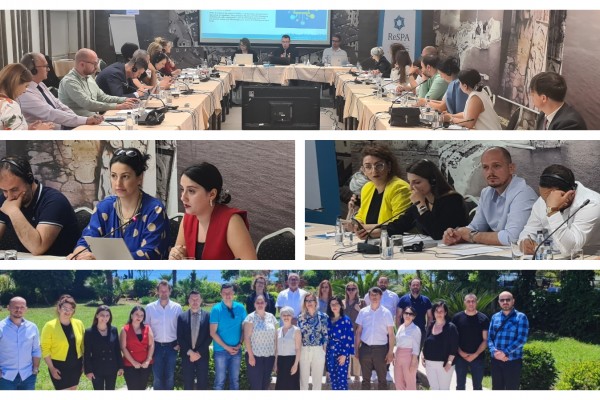
ReSPA empowers the civil servants to better understand the digitalization of the HRM data and processes: HRMIS has no alternative - it is the way forward for all ReSPA members, and once established, it can bring many benefits
At the workshop on "Digitalisation of Human Resources Management Data and Processes in the Western Balkan", 18 senior managers and officers dealing with HRM analytics and data policy in the line Ministries from ReSPA Members dived deeply into the technical side of the HRMISs, its functionality and overall digitalization and HRM modules.
The functionality of HRMIS and digitalization, emerging technologies and HRM modules such as HR records keeping, recruitment, testing and mobility, training and development were just some topics tackled during the workshop. Participants concluded that HRMIS has no alternative - it is the way forward for all ReSPA members, and once established, it can bring many benefits. They also underlined the importance of the human factor and strengthening the digital skills of all public servants, monitoring and measuring user experience and designing/tracking the impact of HRMIS on humans.
"Extremely useful workshop! The Republic of Serbia is in the phase of the introduction of the new HRMIS. Experiences of colleagues from the region show that the challenges in digitalization of the human resources management processes advance our consideration of the function as a whole and contribute to its development."
Ivana Savićević, Assistant Minister, MDULS, Republic of Serbia
Participants demonstrated inspiring practices from the Western Balkans: representatives of Albania presented where they stand regarding the Interoperability of the HRMIS, and those from Serbia explained how they take advantage of the modern technologies with the new HRMIS. Representatives from FBiH gave an overview on centralized data entry in FBiH, while those from Montenegro focused on self-service and mobile access. Finally, representatives from North Macedonia presented how to keep data up to date in cooperation with the Public Revenue Office.
ReSPA experts Driart Elshani and Kaido Paabusk presented the HRMIS self-assessment framework giving an overview of the HRM digitalization in the Public Administration Reform Strategies in the Western Balkans. Tarmo Leppoja, General Director of the State Shared Service Centre from Estonia, presented the Estonian practice in this area, focusing on HRMIS in the service of shared support services.
"We in ReSPA are continuously working on empowering civil servants to respond better to the significant societal challenges because we are aware that human capital is the most critical asset of the Western Balkans governments in progressing with the reforms in the public administrations.
We tailored this workshop to meet the urgent needs of our working group members dealing with the HRM to keep up with the technological transformation and reforms. We are all aware that governments strive to put the citizens first, and thus digitalization is a vital element in all areas, including the HRMD. It should be a trajectory for many improvements to enable civil servants to reduce stress while working more efficiently. Their engagement and active participation during this workshop confirmed their commitment to learn, upscale, and progress. I am sure that they will transfer the knowledge gained in this workshop to their colleagues and eventually influence the progress in their respective institutions." underscored Ranka Bartula-Mušikić, ReSPA Programme Manager.



